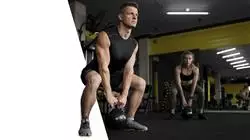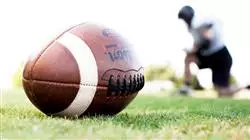University certificate
Scientific endorser

The world's largest faculty of sports science”
Introduction to the Program
A qualification that is increasingly necessary for elite athletes to keep what they have achieved with sacrifice in their careers"

There are several consulting firms that provide really worrying data on the mismanagement of wealth by top-level athletes. For example, it is estimated that, years after retirement, about 80% of American soccer players end up broke or in manifestly precarious economic situations. These are significant figures that reflect the danger of the elite athlete managing his fortune without seeking advice, or with inadequate advice.
For this reason, the aim of this Postgraduate diploma is to offer the current and necessary knowledge of the most effective techniques for heritage preservation. With the specialization they will acquire, the Sports Science professional will be able to diligently manage their own assets or advise with guarantees to athletes on the corrections to be made to avoid economic fiasco.
Thus, these objectives will be achieved by developing an extensive tour of the legal and labor regime of athletes at different levels, delving into key aspects such as the determination of tax residence or the application of different tax rates. This will lay the groundwork for approaching wealth management through the design of contingency plans or through the evaluation of responsible investment options.
This comprehensive specialization will be a guarantee for the student, who will be able to study the program at their own pace and benefit from the educational innovations made available by TECH in the Virtual Campus.
You will determine the keys to proper asset management, establishing a contingency plan for unexpected situations"
This Postgraduate diploma in Advising Professional Athletes contains the most complete and up-to-date scientific program on the market. The most important features include:
- The development of case studies presented by experts on the legal and labor regime of professional athletes
- The graphic, schematic and eminently practical contents of the book provide legal and practical information on those disciplines that are essential for professional practice
- Practical exercises where self-assessment can be used to improve learning
- Its special emphasis on innovative methodologies
- Theoretical lessons, questions to the expert, debate forums on controversial topics, and individual reflection assignments
- Content that is accessible from any fixed or portable device with an Internet connection
Thanks to the advanced theoretical and practical training that TECH will provide you with, you will be able to handle all forms of contract termination, focusing on the most relevant ones"
The program’s teaching staff includes professionals from the sector who contribute their work experience to this educational program, as well as renowned specialists from leading societies and prestigious universities.
Its multimedia content, developed with the latest educational technology, will provide the professional with situated and contextual learning, i.e., a simulated environment that will provide an immersive education programmed to learn in real situations.
The design of this program focuses on Problem-Based Learning, by means of which the professional must try to solve the different professional practice situations that are presented throughout the academic course. This will be done with the help of an innovative system of interactive videos made by renowned experts.
An increasingly demanded specialization with which you will master the assumptions whereby the athlete can transfer his tax residence in a legal manner"

With the updated knowledge of this Postgraduate diploma you will identify the best investment options without putting your assets at risk"
Why study at TECH?
TECH is the world’s largest online university. With an impressive catalog of more than 14,000 university programs available in 11 languages, it is positioned as a leader in employability, with a 99% job placement rate. In addition, it relies on an enormous faculty of more than 6,000 professors of the highest international renown.

Study at the world's largest online university and guarantee your professional success. The future starts at TECH”
The world’s best online university according to FORBES
The prestigious Forbes magazine, specialized in business and finance, has highlighted TECH as “the world's best online university” This is what they have recently stated in an article in their digital edition in which they echo the success story of this institution, “thanks to the academic offer it provides, the selection of its teaching staff, and an innovative learning method aimed at educating the professionals of the future”
A revolutionary study method, a cutting-edge faculty and a practical focus: the key to TECH's success.
The most complete study plans on the university scene
TECH offers the most complete study plans on the university scene, with syllabuses that cover fundamental concepts and, at the same time, the main scientific advances in their specific scientific areas. In addition, these programs are continuously being updated to guarantee students the academic vanguard and the most in-demand professional skills. In this way, the university's qualifications provide its graduates with a significant advantage to propel their careers to success.
TECH offers the most comprehensive and intensive study plans on the current university scene.
A world-class teaching staff
TECH's teaching staff is made up of more than 6,000 professors with the highest international recognition. Professors, researchers and top executives of multinational companies, including Isaiah Covington, performance coach of the Boston Celtics; Magda Romanska, principal investigator at Harvard MetaLAB; Ignacio Wistumba, chairman of the department of translational molecular pathology at MD Anderson Cancer Center; and D.W. Pine, creative director of TIME magazine, among others.
Internationally renowned experts, specialized in different branches of Health, Technology, Communication and Business, form part of the TECH faculty.
A unique learning method
TECH is the first university to use Relearning in all its programs. It is the best online learning methodology, accredited with international teaching quality certifications, provided by prestigious educational agencies. In addition, this disruptive educational model is complemented with the “Case Method”, thereby setting up a unique online teaching strategy. Innovative teaching resources are also implemented, including detailed videos, infographics and interactive summaries.
TECH combines Relearning and the Case Method in all its university programs to guarantee excellent theoretical and practical learning, studying whenever and wherever you want.
The world's largest online university
TECH is the world’s largest online university. We are the largest educational institution, with the best and widest online educational catalog, one hundred percent online and covering the vast majority of areas of knowledge. We offer a large selection of our own degrees and accredited online undergraduate and postgraduate degrees. In total, more than 14,000 university degrees, in eleven different languages, make us the largest educational largest in the world.
TECH has the world's most extensive catalog of academic and official programs, available in more than 11 languages.
Google Premier Partner
The American technology giant has awarded TECH the Google Google Premier Partner badge. This award, which is only available to 3% of the world's companies, highlights the efficient, flexible and tailored experience that this university provides to students. The recognition as a Google Premier Partner not only accredits the maximum rigor, performance and investment in TECH's digital infrastructures, but also places this university as one of the world's leading technology companies.
Google has positioned TECH in the top 3% of the world's most important technology companies by awarding it its Google Premier Partner badge.
The official online university of the NBA
TECH is the official online university of the NBA. Thanks to our agreement with the biggest league in basketball, we offer our students exclusive university programs, as well as a wide variety of educational resources focused on the business of the league and other areas of the sports industry. Each program is made up of a uniquely designed syllabus and features exceptional guest hosts: professionals with a distinguished sports background who will offer their expertise on the most relevant topics.
TECH has been selected by the NBA, the world's top basketball league, as its official online university.
The top-rated university by its students
Students have positioned TECH as the world's top-rated university on the main review websites, with a highest rating of 4.9 out of 5, obtained from more than 1,000 reviews. These results consolidate TECH as the benchmark university institution at an international level, reflecting the excellence and positive impact of its educational model.” reflecting the excellence and positive impact of its educational model.”
TECH is the world’s top-rated university by its students.
Leaders in employability
TECH has managed to become the leading university in employability. 99% of its students obtain jobs in the academic field they have studied, within one year of completing any of the university's programs. A similar number achieve immediate career enhancement. All this thanks to a study methodology that bases its effectiveness on the acquisition of practical skills, which are absolutely necessary for professional development.
99% of TECH graduates find a job within a year of completing their studies.
Postgraduate Diploma in Advising Professional Athletes
If you have a passion for sports and want to specialize in counseling professional athletes, our Postgraduate Diploma in Counseling Professional Athletes at TECH Global University is perfect for you. Through high quality virtual classes, taught by specialists from our Faculty of Sports Sciences, we will provide you with the tools and knowledge necessary to understand the specific needs and challenges faced by professional athletes in their careers, and how to provide them with comprehensive and personalized advice.
In this online program, you will immerse yourself in the world of professional sports, learning about topics such as sports career management, nutrition and health, training and physical preparation, image management and branding, financial and legal management, among others. Through case studies and real-life examples, you will be able to apply this knowledge in practical situations and develop effective coaching skills. In addition, you will be supported by expert professors in the field of sport and have access to exclusive resources to enrich your skills. Become an expert in advising professional athletes with the Postgraduate Diploma in TECH Global University!"







